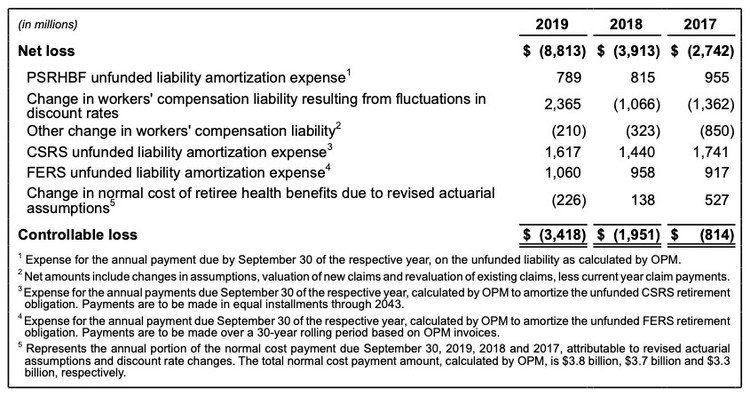We Deliver for Who? USPS Financial Woes Continue; Congressional Reform Unlikely.
To be sure, some of that deficit is due to actuarial factor. For example, USPS’s workers’ compensation charge was $3.5 billion last year — much higher than usual due to a change in the way this expense is computed. But even if one wipes away this expense and other “uncontrollable costs,” the U.S. Postal Service still lost $3.4 billion.

Source: U.S. Postal Service, Form 10-K, September 30, 2019.
The USPS’s plight is existential. Mail volume has dropped nearly 30% since 2008. The demand for paper mail has plunged, and the private sector is eating the postal worker’s lunch. As USPS notes in its latest financial filing:
“We compete for our business in many different market segments. A wide variety of communications media compete for the same types of transactions and communications that are conducted using our services. These channels include, but are not limited to, newspapers, telecommunications, television, email, social networking and electronic funds transfers. The package and express delivery businesses are highly competitive, with both national and local
Competitors. The most significant competitive factor for First-Class Mail is digital communication, including electronic mail, as well as other digital technologies such as online bill payment and presentment. For Marketing Mail, digital forms of advertising including digital mobile advertising and social media are the most significant forms of competition. The primary competitors of our Shipping and Packages services are FedEx Corporation and United Parcel Service, Inc., as well as other national, regional and local delivery companies and crowdsourced carriers. We see additional competition coming from existing customers, such as Amazon.com, Inc., that are testing and in some cases implementing ‘last-mile’ services. Our Shipping and Packages business competes on the basis of the breadth of our service network, convenience, reliability and economy of the service provided.”
Government-run monopolies seldom succeed in the long run, and the USPS is no exception. Its survival will require reinventing the agency for the 21st century.
The USPS’s leadership and union heads have negotiated some small changes. Unfortunately, neither has shown much imagination. The agency — which once experimented with moving mail by rockets and pneumatic tubes — lost its innovation mojo long ago. The former postmaster general, who could neither persuade legislators nor conceive a new future for the agency, was recently eased into retirement. A replacement has not been nominated, leaving the agency directionless.
And Congress would need to act to affect a wholesale rebirth of the Postal Service. The Legislature needs to take a weed whacker to the thicket of laws, regulations and court and arbitrator rulings that entangle the agency.
Yet over the past year, Congress seems to have made little headway on reform. The House Committee on Oversight and Reform, which has jurisdiction over postal bills, has not advanced a bill; it has been busy with impeachment-related activities and its chairman, Elijah Cummings, D- M.D., died in October. The Senate Homeland Security and Governmental Affairs Committee has been similarly challenged. Chairman Ron Johnson, R-Wis., is game to make major changes, including putting the USPS through a bankruptcy-type proceeding, but Ranking Member Gary Peters, D-Mich., seems focused on preserving frequent and rapid mail service in rural areas and opposing anything that looks like “privatization.”
It is a grim situation, and a perilous one. The USPS is a massive financial enterprise that does $70 billion a year in business and employs nearly half a million Americans full time. The Postal Service does not rely on annual appropriations, so were it to run out of cash, it would simply shut down — which would be good for no one and harmful for many businesses and citizens who rely on it. One can only hope that the high stakes will soon compel USPS management, union heads, Democrats and Republicans to come together and make the tough decisions that will enable the Postal Service to flourish in the 21st century.







